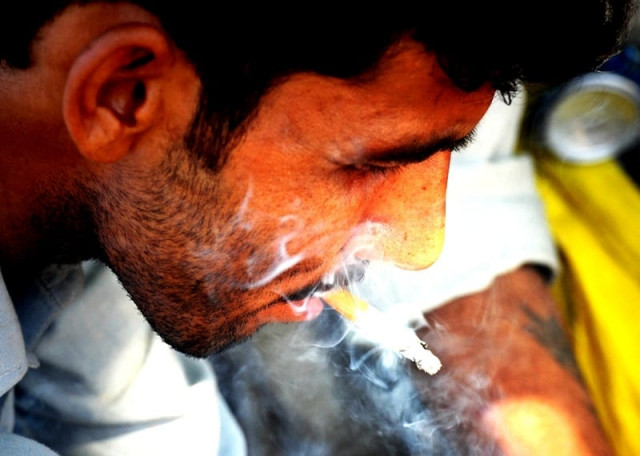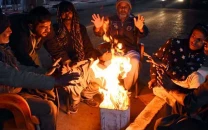Unrest fuels marijuana boom in Pakistan
An army offensive and infighting between militia are forcing prices and demand to an all-time high.

In Pakistan, marijuana is a much loved indulgence. So much so, people are forking out double if not triple the cash to feed their habit.
An army offensive and infighting between militia are forcing prices and demand to an all-time high, making drug profits another unsavoury side effect of Taliban-linked violence plaguing northwest Pakistan.
Narcotics also lines the coffers of local warlord Mangal Bagh, Taliban factions and the rival Ansar al Islam group in Khyber district.
“Everyone is tense, everyone is depressed and hash is the easiest available remedy. People use it to forget their worries,” said Kamal Khan, a 51-year-old English teacher, eagerly rolling a cigarette.
He empties the tobacco from the paper column, warms some hash under a lit match until it becomes greasy, then rubs it between two fingers and mixes it into the tobacco, before packing it back down into the cigarette.
“Everybody is a hashish addict -- police, doctors, officers -- a lot of people come here,” said Khan, whose name has been changed on request, using the local slang that translates as “black gold”.
“It opens the hidden corner of your mind and you explore new ideas and thoughts when you smoke,” he added.
Constantly under pressure from the Americans to move against the al Qaeda-linked Haqqani network, Pakistan has instead concentrated this year on local Taliban and Bagh’s Lashkar-e-Islam mafia in Khyber.
Like the rest of Pakistan’s tribal belt, the district lies outside state control, where drug trafficking takes place beyond the writ of the government.
The area is fiercely independent and awash with guns -- or as the saying goes, “even if the stove at home is cold, the barrel of a gun must be kept warm”.
Fighting has been a way of life for years, but now more than half a million Pakistanis have fled battles between the army and militants since January 20.
The town of Bara, a centre for the hash trade, is under siege.
In the far-flung valley of Tirah, some of Pakistan’s most fertile land for marijuana and opium, Lashkar-e-Islam and Ansarul Islam are slogging it out for control -- their last hope for survival after losing ground to the army.
“Bomb blasts, fighting, inflation, our society is full of worries and it is increasing demand,” said shopkeeper Arshad Afridi.
Fellow shopkeeper Rehmat Khan concurred.
“Before the operations, a kilo of hashish cost around Rs20,000 ($200). Now it starts from Rs50,000 ($530) and goes up to Rs65,000 ($690),” said Khan.
The boom has been a bonanza to hash merchants who stockpiled hash in goat skins in leaner years, waiting to cash in on military offensives to sell at a higher price.
According to shopkeepers, militant groups who control Tirah get Rs2,000 per kilo of hash or as much as Rs80,000 for a 40-kilo consignment intercepted at a checkpoint.
They say they earn Rs10,000 per kilo and a smuggler Rs5,000 per kilo delivered to the neighbouring province of Punjab.
None of the spokesman of both the militant groups were available for comment.
At Jam Bazaar, people openly share cigarettes, even with tribal policemen extracting bribes from passenger coaches.
Loose black and dark brown hash sits on glass counters in hundreds of shops, come of them air conditioned to keep the quality, as shopkeepers drink tea and smoke while trucks and lorries roar past en route to the Afghan border.
It’s grown locally in Tirah, a valley cut off from the rest of the world by mountains and to a large extent, a no-go area for Pakistani government forces.
Farmers say hash is worth far more what they would get for an ordinary crop.
“We’ve been doing this business for decades because we have no other source of income,” Zaman Afridi, a shopkeeper from Tirah, told AFP.
Wearing a traditional turban, vest and fingering wooden beads in his left hand, Zaman said that planting wheat would earn him Rs20,000 but he gets double for planting hash. “If the fields turn out good, then we may get more.”



















COMMENTS
Comments are moderated and generally will be posted if they are on-topic and not abusive.
For more information, please see our Comments FAQ